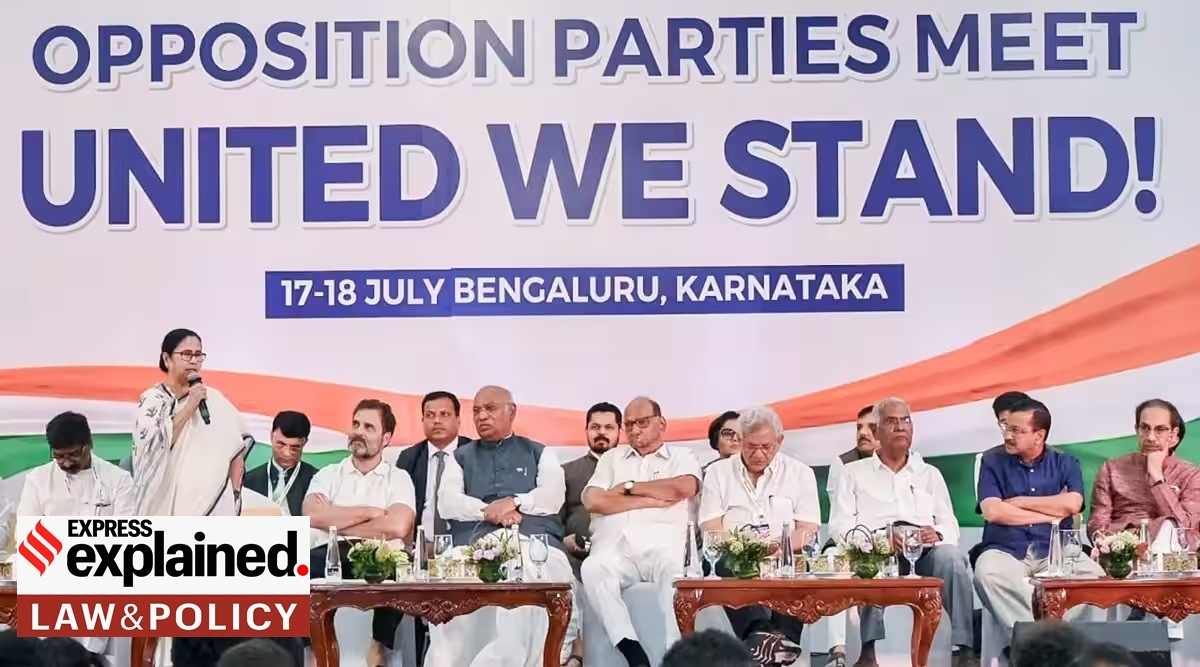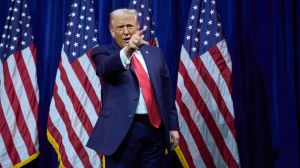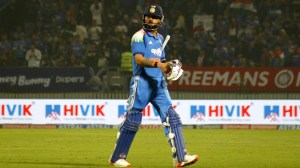PIL against Opposition alliance’s ‘INDIA’ name: What does the Emblems and Names Act say?
The petitioner has said that by “dragging” the name of the country, Congress leader Rahul Gandhi has “very cunningly presented the name of their alliance... to show that the NDA/ BJP govt as in conflict with the nation i.e., INDIA”. He has also said it goes against the Emblems and Names (Prevention of Improper Use) Act, 1950.
 The Opposition coalition for the 2024 general elections was named Indian National Developmental Inclusive Alliance (INDIA) at the end of a two-day conclave of 26 Opposition parties in Bengaluru on July 18, 2023. (File photo)
The Opposition coalition for the 2024 general elections was named Indian National Developmental Inclusive Alliance (INDIA) at the end of a two-day conclave of 26 Opposition parties in Bengaluru on July 18, 2023. (File photo) Delhi High Court has sought responses from the Centre, the Election Commission of India (ECI), and an alliance of 26 opposition parties in a public interest litigation (PIL) against these parties’ use of the acronym I.N.D.I.A. (Indian National Developmental Inclusive Alliance).
The PIL has contended that the use of the acronym violates provisions of The Emblems and Names (Prevention of Improper Use) Act, 1950.
What is this case?
The PIL has been filed by social worker Girish Bharadwaj against the formation of an “alliance using the name INDIA”. The plea seeks directions to the parties prohibiting them from using the acronym, and a direction to the Centre and ECI to take action against them.
Bharadwaj has said he is aggrieved by the ECI’s inaction against the 26 parties in the alliance, and that by “dragging” the name of the country, Congress leader Rahul Gandhi has “very cunningly presented the name of their alliance while attempting to show that the NDA/ BJP government as in conflict with the nation i.e., INDIA”.
According to the plea, this “created confusion in the mind of common people that the upcoming general election of 2024” will be fought “between political parties or between alliance and our country”. Bharadwaj has said he sent a representation to the ECI on July 19, but the panel had taken no action. According to the petitioner, the acronym could lead to “political hatred” and eventually “political violence”.
Importantly, the plea states that naming the alliance I.N.D.I.A. is barred under Sections 2 and 3 of The Emblems and Names (Prevention of Improper Use) Act, 1950.
Observing that the case requires a further hearing, the Bench of Chief Justice Satish Chandra Sharma and Justice Amit Mahajan listed the matter for October 31.
What is the 1950 Act?
The Act was passed on March 1, 1950, to “prevent the improper use of certain emblems and names for professional and commercial purposes”. Section 2 of the Act defines emblem as “any emblem, seal, flag, insignia, coat-of-arms, or pictorial representation specified in the Schedule”. “Name” includes “any abbreviation of a name”.
Section 3 of the Act prohibits the “improper use of certain emblems and names”. It stipulates that except in “such cases and under such conditions as may be prescribed by the Central Government”, no person shall “use or continue to use, for the purpose of any trade, business, calling or profession, or in the title of any patent, or in any trademark or design, any name or emblem specified in the Schedule or any colourable imitation”.
On March 21, 1975, the top court dismissed a batch of petitions against the 1950 Act that alleged that Sections 3, 4, and 8 confer “unguided, uncanalised and arbitrary power on the Central Government”. (‘M/S. Sable Waghire & Co. vs. Union Of India’)
Upholding the constitutionality of the Act, the SC held that “Entry 49 of List I may well supply the coverage for the Union legislative field so far as the Act is concerned. Trade marks, designs, and merchandise marks may legitimately take in matters relating to their abuses and improper uses. Even otherwise the residuary entry 97 of List I is of wide amplitude to take care of the particular subject’ matter of legislation, namely, prevention of improper use of certain emblems and names for professional and/or commercial purposes.”
Entry 49 of List 1 of the Seventh Schedule specifies “patents, inventions and designs; copyright; trade-marks and merchandise marks” as subjects the Centre has the exclusive power to legislate over. Entry 97 of the same list brings “any other matter not enumerated in List II or List III, including any tax”, under the purview of the Centre’s exclusive control.
What powers are exercised by the Centre under this Act?
Section 4 prohibits the registration of certain companies by a “competent authority” (an authority competent under law to register any company, firm, or other body of persons, or any trademark, design, or grant of patent) if it bears a title containing “any name or emblem” in contravention of Section 3.
If any question arises before such an authority as to whether any emblem falls under the ones specified in the Schedule, the authority may refer the question to the Centre, following which the latter’s decision will be final.
Any person who violates the provisions of Section 3 of the 1950 Act “shall be punishable with fine which may extend to five hundred rupees”. However, no prosecution for any offence punishable under this Act “shall be instituted, except with the previous sanction of the Central Government or of any officer authorized in this behalf by general or special order of the Central Government”.
Thus, even the competent authority’s power to initiate prosecution is subject to the Centre’s approval.
Besides this, the Centre’s power has been extended to amending the Act’s Schedule under Section 8. “The Central Government may, by notification in the Gazette, add to or alter the Schedule, and any such addition or alternation shall have effect as if it had been made by this Act,” the provision states.
The government also has the power to make rules “to fulfil the objectives of this Act”, which will be published in the Official Gazette, Section 9 states.
However, every such rule will be laid before both Houses of Parliament for thirty days while in session, following which, if a modification or cancellation of the same is suggested, the rule will have effect only in such modified form or no effect at all. Despite this, any such modification or annulment of the rule “shall be without prejudice to the validity of anything previously done under that rule”.
What does the Act’s “Schedule” say?
The 1950 Act’s Schedule has been amended repeatedly. As of date, it prohibits the improper usage of the name, emblem, or official seal of the Government of India (GOI) or of any state, the World Health Organisation (WHO), or the United Nations Organisation (UNO).
It also bars such usage of the national flag, the Prime Minister, the President, and the Governor’s seal, name, and emblem. Besides this, using names, emblems, or seals of historical figures like Mahatma Gandhi, Jawaharlal Nehru, Lal Bahadur Shastri, and Indira Gandhi is also prohibited.
A consideration of item 7 of the Act’s Schedule shows that any name that suggests or is “calculated to suggest” the Indian government’s or a state’s patronage or a “connection with any local authority, corporation, or body” established by the government under any law in force for the time being will amount to “improper use” under the legislation.
For example, the Indian Council of Agricultural Research is a registered body under the Ministry of Agriculture and Cooperation. So, any name beginning with the words “Indian Council of” can mislead the public into believing that the institute has government backing or patronage.
- 01
- 02
- 03
- 04
- 05






































